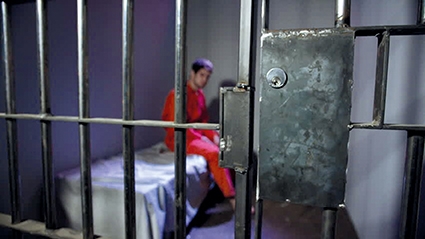Justice Minister: There Is No More Ill-Treatment of Prisoners
Georgia’s Minister of Justice, Thea Tsulukiani, has said that the ill-treatment of people in the country’s penitentiary institutions is now “something of the past.” The Minister made the statement after the European Committee for the Prevention of Torture and Inhuman or Degrading Treatment (CPT), an anti-torture committee of the Council of Europe, published a positive report on Georgia.
The Minister stated at a special press-conference that the legislative changes that have been implemented under the current government are positively evaluated in the report, which is based on the CPT delegation’s visit to the country on September 10-21, 2018.
During the visit, the delegation assessed progress made in the implementation of the recommendations made by the CPT following the previous visit in 2014. In this context, the delegation paid particular attention to the treatment of persons in police custody and the situation of prisoners in penitentiary establishments, in particular those in high-risk and semi-open prisons, as well as juvenile inmates. In addition, the delegation carried out visits to several psychiatric hospitals and, for the first time in Georgia, to an immigration detention facility.
"The conclusion proves that in Georgian prisons, in temporary detention isolators and in all penitentiary establishments, state violence against people has once and for all been eradicated,” Tsulukiani stated, adding that as the problem of ill-treatment of inmates has been eliminated in Georgia, the Committee called on the government to protect the rights of inmates even better and to focus more on their re-socialization and rehabilitation.
The report on Georgia reads that the CPT delegation spoke with many persons who were or had recently been in police custody, and received hardly any allegations of ill-treatment by police officers.
“As previously, no allegations were heard of staff working in temporary detention isolators (TDIs). Furthermore, none of the very few allegations heard could be considered credible, backed by medical evidence and/or referring to the recent past. Overall, the CPT received a very positive impression of the sustained efforts of the Ministry of Internal Affairs aimed at combating police ill-treatment,” the report reads.
The delegation also said that they did not receive any allegations of ill-treatment by staff from the Temporary Accommodation Center (TAC) of the Migration Department of the Ministry of Internal Affairs. Further, it appeared that conflicts between detained foreign nationals were rare and never of any serious nature. The overall atmosphere at the TAC was “relaxed.”
Regarding the environment in the prisons, the delegation heard hardly any allegations of ill-treatment of inmates by staff. Overall, as assessed, there was a “relaxed atmosphere and good staff-prisoner relations” in the prisons visited.
“Only a few isolated allegations were heard of excessive force used while prisoners were transferred to so-called ‘de-escalation rooms,’ especially at Prison No. 6. The CPT stated that custodial staff in all Georgian prisons, and especially at Prison No. 6, would benefit from more training in dealing with high-risk situations and challenging inmates, including in verbal communication, de-escalation techniques and manual control,” the report reads.
As regards inter-prisoner violence, the delegation said it was not a major issue in closed-type prisons, except for a few allegations and other indications. The report says this was hardly surprising given the very low staff/prisoner ratio and the limited presence of staff in inmate accommodation areas.
Moreover, the report says that at Prison No. 15, there was a pernicious influence of informal prisoner hierarchy. The CPT stressed that this was totally unacceptable; the (re)emergence of this phenomenon at Prison No. 15 was a troubling sign and major efforts were required to ensure that it did not spread throughout the prison system.
The delegation also visited three psychiatric hospitals, where they found some violations, mainly in accommodation, treatment and lack of psychiatrists. The CPT called upon the Georgian authorities to make every effort to fully implement their 2014 de-institutionalization Action Plan and, in this context, substantially develop psychiatric care in the community.
The CPT was set up under the Council of Europe’s “European Convention for the Prevention of Torture and Inhuman or Degrading Treatment or Punishment,” which came into force in 1989.
The CPT is not an investigative body, but provides a non-judicial preventive mechanism to protect persons deprived of their liberty against torture and other forms of ill-treatment. It thus complements the judicial work of the European Court of Human Rights.
By Thea Morrison
Image source: Shutterlock












